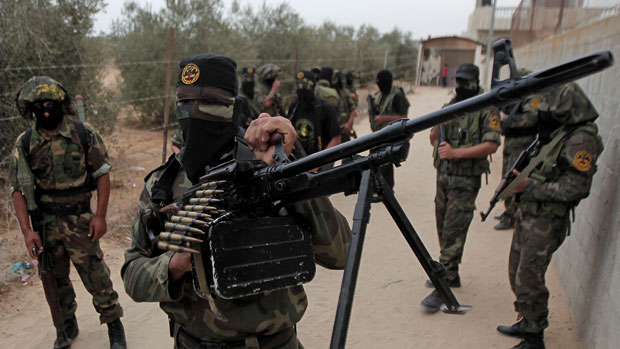MI6: 'Impossible' to track jihadists returning to UK
UK security services will have to prioritise who they track, says former M16 director Richard Barrett

A free daily email with the biggest news stories of the day – and the best features from TheWeek.com
You are now subscribed
Your newsletter sign-up was successful
Britain's security services cannot afford to track all of the people returning to the UK after fighting in Syria and Iraq, a former M16 director has warned.
Richard Barrett is due to release a new report that claims the Syrian war "is likely to be an incubator for a new generation of terrorists".
Following reports that there could be as many as 500 Britons fighting in Syria and Iraq, Barrett said those who represent a terror threat on their return would be a "very small" but unpredictable number.
The Week
Escape your echo chamber. Get the facts behind the news, plus analysis from multiple perspectives.

Sign up for The Week's Free Newsletters
From our morning news briefing to a weekly Good News Newsletter, get the best of The Week delivered directly to your inbox.
From our morning news briefing to a weekly Good News Newsletter, get the best of The Week delivered directly to your inbox.
He estimated that "possibly up to 300 people have come back to the UK" already. "If you imagine what it would cost to really look at 300 people in depth, clearly it would be completely impossible to do that, probably impossible even at a third of that number," he told the Independent on Sunday.
Barrett described the radicalisation of young Britons as "perplexing", but suggested that one reason they were heading to Syria was a lack of a sense of identity in the UK.
He told the BBC News Channel that security services would have to choose which fighters they think will pose the greatest risk and, beyond that, rely "very much on members of the community and other people expressing their concern".
Yesterday, Metropolitan Police Assistant Commissioner Cressida Dick, head of specialist operations including counter terrorism, warned that UK police would have to deal with the threat of British fighters returning from Syria for "many years to come".
A free daily email with the biggest news stories of the day – and the best features from TheWeek.com
Their comments come as further evidence of the British links with jihadists in Iraq emerged over the weekend, with confirmation that Nasser Muthana, a 20-year-old from Cardiff, was one of a number of Britons who featured in a film posted online to recruit fighters.
His father, Ahmed Muthana, 57, claimed he had no idea his son had gone to Syria and thought he had gone to Shrewsbury seven months ago. Nasser's 17-year-old brother Aseel is also in Syria.
-
 The 8 best TV shows of the 1960s
The 8 best TV shows of the 1960sThe standout shows of this decade take viewers from outer space to the Wild West
-
 Microdramas are booming
Microdramas are boomingUnder the radar Scroll to watch a whole movie
-
 The Olympic timekeepers keeping the Games on track
The Olympic timekeepers keeping the Games on trackUnder the Radar Swiss watchmaking giant Omega has been at the finish line of every Olympic Games for nearly 100 years
-
 Epstein files topple law CEO, roil UK government
Epstein files topple law CEO, roil UK governmentSpeed Read Peter Mandelson, Britain’s former ambassador to the US, is caught up in the scandal
-
 Iran and US prepare to meet after skirmishes
Iran and US prepare to meet after skirmishesSpeed Read The incident comes amid heightened tensions in the Middle East
-
 Israel retrieves final hostage’s body from Gaza
Israel retrieves final hostage’s body from GazaSpeed Read The 24-year-old police officer was killed during the initial Hamas attack
-
 China’s Xi targets top general in growing purge
China’s Xi targets top general in growing purgeSpeed Read Zhang Youxia is being investigated over ‘grave violations’ of the law
-
 Panama and Canada are negotiating over a crucial copper mine
Panama and Canada are negotiating over a crucial copper mineIn the Spotlight Panama is set to make a final decision on the mine this summer
-
 Why Greenland’s natural resources are nearly impossible to mine
Why Greenland’s natural resources are nearly impossible to mineThe Explainer The country’s natural landscape makes the task extremely difficult
-
 Iran cuts internet as protests escalate
Iran cuts internet as protests escalateSpeed Reada Government buildings across the country have been set on fire
-
 US nabs ‘shadow’ tanker claimed by Russia
US nabs ‘shadow’ tanker claimed by RussiaSpeed Read The ship was one of two vessels seized by the US military